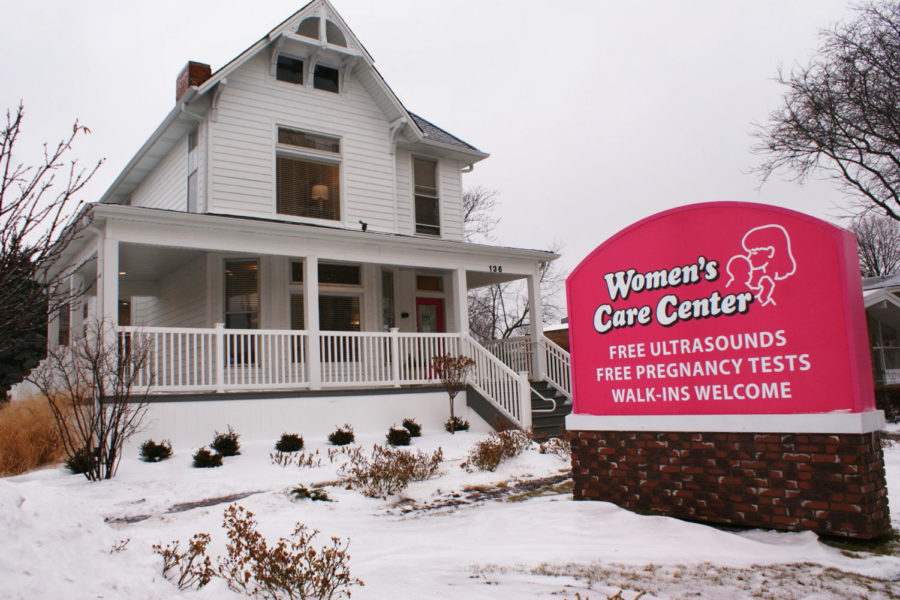Pregnancy center opens in La Grange
Women’s Care Center opens its doors, met with skepticism from pro-choice critics
January 25, 2019
Driving down LaGrange Road, one’s interest may be piqued by the bright pink sign outside of a house converted into an office building. The building is home to the newly opened branch of the Women’s Care Center (136 N. LaGrange Rd.), an Indiana-based pro-life organization offering ultrasounds and counseling to women with unplanned pregnancies.
Across the country, a host of pregnancy resource centers like the Women’s Care Center have sprouted up in communities large and small. Some medical professionals and reproductive rights advocates, however, have said these organizations often use deceptive practices to get people into the door and provide misleading information to their patients.
Local resident Maura Quinlan, assistant professor at Northwestern University and OBGYN—a doctor that specializes in women’s health and pregnancies—argues that the Women’s Care Center is a Crisis Pregnancy Center (CPC), or an organization that attempts to convince women with unexpected pregnancies to not get abortions.
“The concern is that people with unplanned pregnancies need to be given all the legal options available to them, with appropriate counseling to find what is really right for them and their circumstance,” Dr. Quinlan said. “These institutions don’t do that.”
The Women’s Care Center did not agree to an in-person interview, but in emails to The LION, officials repeatedly claimed that they provide their clients the whole slew of options when it comes to pregnancies and abortions.
Organizations with similar goals as the Women’s Care Center, however, have long been a source of concern for many advocates of women’s health, and are a hot topic in the debate over abortion. According to Slate Magazine, in 2015 CPCs outnumbered clinics that offer abortions three-to-one.
Evita Almassi, the Digital Marketing and Communications Manager with the National Women’s Health Network—which advocates for women’s reproductive rights, including a “women’s right to choose”—alleges that these clinics often warp the truth and use scare tactics to deter women from getting abortions, she said.
“Women who walk into one of these fake [medical] clinics seeking contraception or abortions find themselves being bullied, shamed and lied to,” she wrote in an email.
Quinlan and the National Women’s Health Network laid out examples of misinformation that some CPCs have utilized in the past, such as overstating the risk of death from abortion or falsely stating that abortion is linked to an increased chance of breast cancer or infertility.
But Dawn Fitzpatrick, member of the board of directors at the pro-life Chicago March for Life and the Senior Coordinator for the Human Dignity and Solidarity Ministry for the Archdiocese of Chicago, claims that all of the information these clinics offer women in crisis is accurate.
“The critics are wrong. Of course [critics] are discouraging people from going to the centers because they would prefer to advance the centers that offer abortions,” she said. “The fact of the matter is, there is nothing false that is coming out of those pregnancy centers or we as the church would not support them.”
The church is strongly against abortion and argues that life begins at conception and ends at natural death, Fitzpatrick said.
“The church has always understood that abortion takes a human life,” she said. “The reason we don’t support [abortion] is because it takes a human life and hurts the people involved.”
As a doctor, Quinlan, the assistant professor Northwestern, said that medical professionals—especially when it comes to abortions—have a right to not provide care that they disagree with. But she argues that they should not allow that to influence the advice that they provide their patients.
“We are told in medical school that the patient comes first. You don’t have to do what you’re not comfortable with, but they come first,” Quinlan said. “You need to tell them that we don’t offer this here, but here is where you can go.”
Katherine Manion, outreach director at the Women’s Care Center, said—while the organization does not provide abortions or refer women to places that provide them—the organization does not seek to take away a woman’s ability to decide what is best for her.
“Women facing unplanned pregnancy do not need a lecture or moralizing,” Manion wrote in an email. “They need love and support. And the end result is most often life. I think we can all agree, that is a wonderful outcome.”
She added: “No matter the situation, becoming pregnant is life-altering. Some women are blessed to have the support they need, however, for those who don’t, Women’s Care Center is here to help.”
At the bottom of their website in the ‘About’ section, The Women’s Care Center parenthetically states that they “do not offer ongoing prenatal care or abortions.” Manion said they do not refer people to facilities that offer abortions, but stated that they are 100 percent open about their medical information and their pregnancy options with their clients. But Quinlan is not sure how much she believes that.
When Quinlan went to visit the clinic in LaGrange in early December, the person she talked to said that, when asked, they do provide information about abortions, she said. However, Quinlan expressed concerns about the veracity of the facts they provide, as they were unwilling to show her the informational packets they provide women.
“If you came to my office and asked to see the information I provide my patients, I would hand you a stack of medical, scientific and factual information,” Quinlan said. “It concerned me that I couldn’t see it because it makes me think it is inaccurate which is unfair to women who go to them thinking they are getting unbiased information.”
A LION reporter went to the LaGrange office in January to request information or literature that the organization provides to their clients but they refused to provide any pamphlets on that visit.
Manion did not call the organization a health care center, but rather a pregnancy resource center for women thrust into the uncomfortable situation of an unplanned pregnancy. While the organization is not a medical organization., Manion said that the organization’s medical director is an OBGYN.
The Women’s Care Center also provides women pregnancy tests, ultrasounds and parenting classes for free.
Almassi of the National Women’s Health Network claims that the pregnancy tests and ultrasounds services provided at these centers seek get women into the door at CPCs while also making these centers look as similar to a medical office as possible.
“Everything from a CPC’s waiting room decor to a woman’s initial interaction with staff is designed to hide the fake [medical] clinic’s religious purpose and mimic a real medical clinic,” Almassi said. “But the counselors aren’t medical providers and they aren’t required to give out medically accurate information—as long as they don’t charge for their services. It’s ‘free speech.’”
The Women’s Care Center has 32 centers in 11 states. The organization serves 28,000 women a year, according to their website. For more information on pregnancy and the risks that accompany it, go to www.cdc.gov/pregnancy/.





















![Movie poster for '[Rec]" (2007).](https://www.lionnewspaper.com/wp-content/uploads/2023/04/rec-640x900.jpg)





Thomas A. Smith • Jan 25, 2019 at 1:36 pm
How ironic that “pro-choice” advocates accuse crisis pregnancy centers like the Women’s Care Center of “deceptive practices” and of providing “misleading information” concerning pregnancy.
Dr. Maura Quinlan, quoted in the article, claims that centers like the Women’s Care Center don’t give mothers complete information concerning their pregnancies. Really? Here are three bits of information that a young mother will never hear in any Planned Parenthood abortuary: (a) that her unborn child is both human and alive (i.e., a human being); (b) that the child is genetically distinct from her mother and her father; (c) that she has a heartbeat as early as two weeks after conception; and (d) that she is capable of feeling pain as early as 8 weeks following conception.
On the sign in front of the Women’s Care Center are two words which no doubt strike fear in the hearts of abortion enthusiasts: “Free Ultrasounds” Studies show that women who are informed, through ultrasound, of their baby’s development are far less likely to chose abortion. And that’s what “pro choice” people want, isn’t it—informed choices?
Women’s Care Center may not provide prenatal care, but there are many organizations which do provide extensive pre- and post-natal care to mothers in crisis. Aid for Women of Chicago is one such organization.
One would think that someone who claims to be “pro-choice” would be interested in making sure that all choices are fully informed. We all should all welcome the Women’s Care Center and wish them well in their mission. And we should do everything possible to support crisis pregnancy mothers before and after the birth of their children.